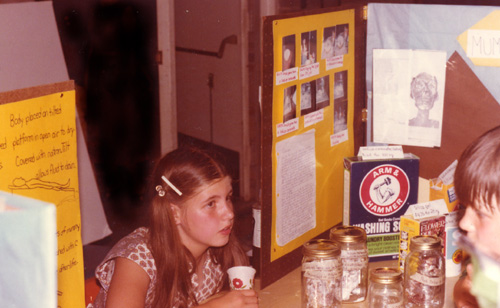I hope you’ve noticed that Seed has sent a team to blog the Intel International Science and Engineering Fair currently raging in Albuquerque, New Mexico.
I love science fairs. I’ve judged them (and recruited others to judge them). At our county fair, I’m always sucked right into the science-fair-type exhibits entered by kids in the Young California exhibit hall.
And of course, as a kid, I did projects for our school science fair.
Actually, it was officially a “curriculum fair” rather than a science fair. Why? Was science too scary an area even for the fifth and sixth grade teachers to oversee? Were they worried that in a “science” fair the female students wouldn’t be able to find projects they understood or connected with?
Really, this is just another one of the eternal mysteries around Why Elementary Schools Do What They Do.

At any rate, here I am with my 5th grade project, in approximately May of 1979. The year before, the King Tut exhibit had come through the Metropolitan Museum of Art in New York. The art in the exhibit was nice and all, but I was interested in the technology — specifically, the mummification technology. I got a bunch of books out of the library and read up on the technique. Undoubtedly, I also grossed a few people out describing the process of mummification.
Reading about it is one thing. I wanted to see how it worked. I obtained the necessary compounds (including baking soda, washing soda, and table salt) and the specimens to be mummified. Those Mason jars to the right of me in the picture contain Cornish game hens I mummified using various combinations of the compounds described in the ancient Egyptian texts on mummification.
Worth noting: Northern New Jersey is a lot more humid than Egypt. And rather than making my mummies out in the open (and then putting them in a tomb), I was making them in the basement. Even with the dehumidifier running full tilt, it was fairly stinky.
But it was for the glory of Science!

cracking. up.